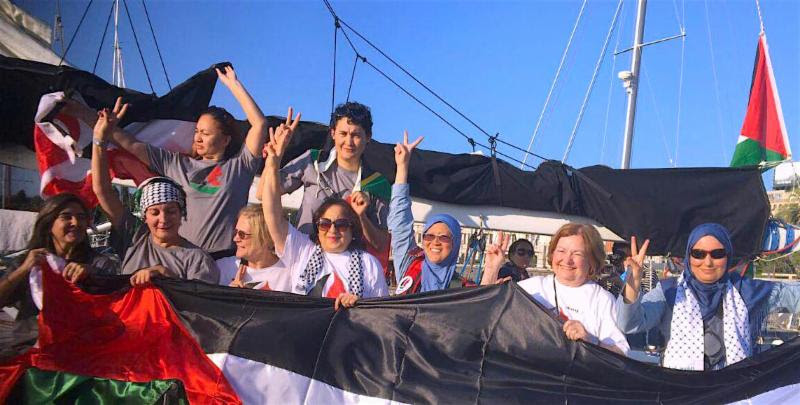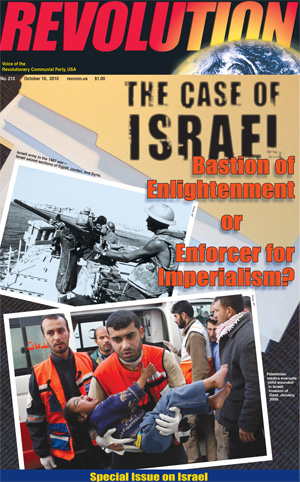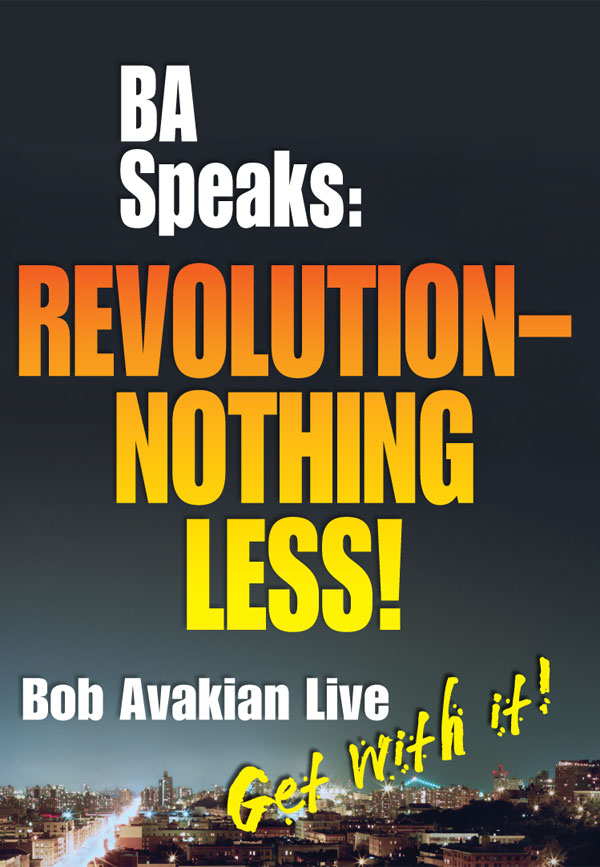Interview with Ann Wright:
The Women’s Boat to Gaza vs. Israel’s Armed Blockade
October 31, 2016 | Revolution Newspaper | revcom.us
The following is a slightly edited rush transcript of an interview with Ann Wright on the Michael Slate Show radio program that aired October 21. Wright and a group of women were on a boat that sailed from Spain toward Palestine to break the Israeli blockade of Gaza when it was seized on October 5 in international waters by an Israeli military vessel.

The Women's Boat to Gaza on board their vessel before being seized by Israeli raiders on the high seas. Ann Wright is in the front row, third from left.
(Photo: forusa.org)
Michael Slate: Ann Wright is a 29-year U.S. Army reserves veteran, a retired colonel and State Department official, and she’s known for her outspoken opposition to the Iraq war and other things. She was a passenger on the Challenger One, which, along with the Mavi Marmara, was part of the Gaza flotilla. The Mavi Marmara was the boat on which nine people were killed a number of years ago. She’s the co-author of the book, Dissent—Voices of Conscience. Ann, welcome to the show.
Ann Wright: Thank you Michael. It’s a pleasure to be with you.
Michael Slate: The Women’s Boat to Gaza—what was this about and who was on the boat?
Ann Wright: It was a mission to bring international attention to the fact that the Israeli government still has an illegal, dangerous blockade on this little place called Gaza. Not only a land blockade but a naval blockade, where three sides of Gaza, this little tiny area, 25 miles long five miles wide, is essentially just isolated from the world because of Israel and Egypt on the southern side of Gaza. But it’s primarily the Israeli blockade that has imprisoned—now over two million people live in Gaza. It’s one of the most densely populated places in the world.
So our mission was to bring international attention by putting women on a boat and taking a long voyage. This was 1,715 miles, starting at Barcelona, Spain, going first to Ajaccio, Corsica, France, and then down to Messina, Sicily, Italy. And then the last leg of it was 1,000 miles from Messina onto offshore of Gaza. We got 35 miles from Gaza when the “Israeli occupation forces” (as we call them), stopped us in international waters on the high seas, kidnapped us and took us against our wills to Israel, stole our boat and then charged us with entering Israel illegally—when we were saying, “You kidnapped us. We didn’t want to even be here,” but [they] charged us with entering Israel illegally and then deported us.
Michael Slate: Who was on the boat?
Ann Wright: On each of the three legs of it we had 13 women, a crew, a tremendous captain that we had from Australia who has extensive international experience, captaining Greenpeace boats and of Médecins Sans Frontières [Doctors Without Borders] boats that have been picking up refugees, migrants on the Mediterranean for several years. She was our captain. And then we had two crew members, one from Norway, one from Sweden. In fact, the two crew members are the ones who wrote the song that you played at the very beginning, a song to the women of Gaza. “We will not be silent until you are free” is really the capturing line of that song.
Michael Slate: It’s a beautiful song, a very powerful song. Why a woman’s boat in particular? Other boats that have gone over there over the years have been general population boats.
Ann Wright: As you mentioned, we’ve had a lot of other ships that have gone, starting in 2008 when the Free Gaza Movement actually were able to get five voyages of small boats into Gaza before in early 2009, the Israeli forces began stopping them forcibly—I mean, ramming their boats and almost sinking them. And then in 2010 six boats with the Gaza Freedom Flotilla, with the attack on the Mavi Marmara as you mentioned, where 9 people were killed, actually executed, and 50 others were wounded. Then in 2011 we had 10 ships that were going to sail to Gaza, but the Israelis paid off the Greek government not to let the ships sail from Greece even though several of us tried to break free and got about five miles offshore Greece before the Greek commandos stopped us. Then in late 2011 we had two boats that actually left from Turkey and then were stopped. In 2012 we had another boat. In 2013, another boat. 2015 we had four boats that attempted to go.
So we’ve had a lot of boats, a lot of international attention, which is the point of this whole thing. But on one level it was like, “Well, we’ve already done that. We need something new that will capture international media attention.” So we thought, “Well, why not send a boat of women?” On the last leg of this mission we had a Nobel Peace laureate, Mairead Maguire from Northern Ireland. We had two members of parliament, one from the Algerian parliament, one from the New Zealand parliament. On previous legs of the voyage we’ve had members of parliament from Spain and Sweden and Tunisia.
Of course, we don’t have a member of the U.S. Congress or legislature, because they’re too afraid of losing their money support for coming out on such a mission. And so I was the only American on it, although there have been plenty of Americans who would have been thrilled to be on it, to represent our country. So many people, millions of people in our country, are totally opposed to the U.S. support for the state of Israel no matter what criminal acts it does.
Michael Slate: In an article you wrote about this particular trip, you did a very poetic thing where you described looking out from the boat as you were captured, and seeing darkness—and the comparison of the darkness and the lights in what was Israeli territory. I wanted you to talk about that.
Ann Wright: Well, we were captured by the Israelis about 4 in the afternoon, and it took about another eight hours for us to be brought into the Israeli court of Ashdod. As we started approaching the shores of Israel and Gaza, it was so distinct. I mean, right in front of us was the last Israeli town before you get to Gaza. That town is Ashkelon. And you can see those three big smoke stacks of the electrical generation power plant there. You can see as you look up to the north, up to the left just an incredible array of lights, because you know, Israel is a very industrialized state now. It’s an economic powerhouse. It’s got all the contraptions of the modern state, all the cities, all the lights and all.
And then you look to the right and it’s darkness. It’s darkness as far as you can see, and that is Gaza. And it’s Gaza that is so severely impacted by the state of Israel. You know, Israel controls all of the electricity that goes into Gaza. It controls the water supply for Gaza. It really controls the resources needed to repair the frequent military attacks on Gaza, the latest big one being in 2014 where over 2,400 people of Gaza—many women and children—were killed by the 51-day attack. Military attack by the most sophisticated military in the Middle East, the Israeli military, which uses Gaza as its testing ground.

And essentially the U.S. is using Gaza as its testing ground too, because the U.S. furnishes weapons and bombs that it is afraid to test itself on human beings because it would be the outrage. But they give it to Israel. For example, the Dense Inert Metal Explosive bomb, the DIME bomb—it was used both in 2009 and 2014. It sprays some sort of microscopic film, but it’s a film that will amputate, will cut off arms and legs and slice off parts of people in a way that has never been seen before. The Norwegian surgeons that were in Gaza and were treating these wounds have written extensively about this.
So it’s U.S. and Israeli experimentation on the people of Gaza that makes us, as American citizens say we’ve got to protest not only the Israeli government but also our own government’s complicity and what’s being done to the people of Gaza. The two million people that now live there; it’s incredible how the population is growing in Gaza despite all the horrific things that are happening to it. And yet the world really turns its back on Gaza.
Michael Slate: There are a lot of risks that you and the other women took on. What were some of those risks that you were aware of and concerned about?
Ann Wright: We didn’t know what the response of the Israeli military would be. We’d seen it in 2010 where they actually murdered people and wounded people. We’d seen it as they assaulted people on boats—they’ve tased them, they’ve hit them with paint bullets. So, we didn’t know what the reaction was going to be, but we had prepared our passengers—our delegates—for the worst. We had gone through all sorts of non-violence training and situations that have occurred in the past. So, we made sure they realized that...it was a dangerous mission and it could be a fatal mission. In fact, one of the women who came all the way to Messina to see us off was the widow of one of the Turkish men who was executed on the Mavi Marmara. And to have her there to see us off really brought home the fact that... you never can tell what young soldiers—I’ve trained them, I’ve been around them—you never can tell what young people with guns will do. And you can’t tell what old people with guns can do either (slight laugh). So anybody with a gun and in a tense, stressful situation—and we knew that the Israeli military was going to tell these young soldiers, young sailors, that, you know, “These are terrorists women. These are just not a Nobel Peace laureate. They’re not just members of Parliament. They stand for terrorism against the state of Israel.” So, we knew the sailors would be tense. And even though we put out lots of publicity on who we were, our backgrounds... it only takes one bullet to get something going.
So we were prepared for the worst. We were willing to do it. As a minimum, we knew we were all going to face time in Israeli prison and we were going to be deported from Israel—a 10-year deportation so if you ever wanted to go back to the West Bank in solidarity with the Palestinians in the West Bank, you knew it was going to be probably a lifetime ban. I don’t think in any way Israel will ever let any of us who have been deported from Israel ever go back. And that means you are really giving up the opportunity to talk with personally, write articles about and witness what the Israelis are doing to the people in the West Bank.
Michael Slate: What was it that compelled you folks to actually take these risks?
Ann Wright: When you see what the Palestinians are going through every single day, whether it’s at the checkpoint and the apartheid wall, the illegal settlements in the West Bank or you see that two million people are really in prison in a place called Gaza. Their whole lives are constricted and constrained by forces that they cannot control. It’s the least we can do to call attention to this in some way.
Of the fact that it’s dangerous—I mean, most people come to grips with it, and you have to do it in order to go ahead and do these things. You kind of make your peace with yourself and with others, although most families are very upset that you go on these things (laughs). But, you know, it’s a conviction within each person’s heart that we who have privilege, that are living in situations where—and particularly when we live in a country that is persecuting others, for example those in Palestine—it is our obligation to speak up and do more really, than speaking up and going on these peaceful, non-violent missions on a boat. We go with a clean heart, a pure heart on it. And what the Israelis do they’re going to have to live with the rest of their lives. So we give them the option of treating us peacefully and hopefully changing their policies toward the Palestinians.
Michael Slate: You folks made the point that the mission of this trip was to break the blockade. Why is this mission so important?
Ann Wright: You need to say that there is a blockade. The mission was to bring international attention to the blockage itself. So, we were intent on going to Gaza, breaking the blockade, going in solidarity with the people, knowing full well that the probability of us actually getting into Gaza was pretty low. But if you don’t say we’re gonna try to break the blockade, then no media’s gonna to cover you. It’s really sad that the actual issue itself is not being covered, so you need to have things as dramatic as 13 women in a small sailboat sailing 1,000 miles across the Mediterranean to challenge the Israeli blockade.
Michael Slate: You also said that in a way this was to bring hope into this situation.
Ann Wright: Indeed it is, and when you see the reaction of the people in Gaza when they know another one of these boats, or maybe two or three boats, or maybe even a whole flotilla of internationals have decided to spend lots of time raising funds to buy boats, get them in good order to invite people from around the world to be on them and then finally sail them... all of this is a year-long process that is used in Gaza by educators, by human rights activists to give hope to the people in Gaza that “We are not forgotten.”
It really was powerful to see all of the things that were happening in Gaza, the young kids that were going out on the beach every day to make sand sculptures to welcome us to Gaza. The Women’s Media Center had a whole week of special workshops of how to write articles, and part of the media was artists making drawings of what it meant for the international community not to forget them. A group called “We Are Not Numbers,” which is a wonderful group of writers and artists in Gaza, did a whole series of videos and essays and photo exhibitions on what it means not to be forgotten.
So in that way we do bring hope. We bring hope that the world is not turning their back on Gaza and that the young people of Gaza—of the two million people, something like 48 percent of them are under the age of 25. So you have a huge population there of young kids that want a life. They want a life without war, without attacks, without drones over them 24 hours a day. Despite all the problems that are caused for the people of Gaza, education still is one of the primary goals. Like 99 percent of the people in Gaza are literate. These young kids want to go to high school, to universities. They want to get scholarships to be able to go to other parts of the world. So anything we can do to give them some hope that they are not forgotten, is really important.
Michael Slate: Alright, Ann Wright. Thank you very much for joining us today.
Ann Wright: It’s been a real pleasure, Michael. Thank you.
Michael Slate: Yeah, me too. And let’s stay in touch so I can find out what you’re doing next, alright?
Ann Wright: Alright. I just came back from North Dakota.
Michael Slate: I wanna talk to you about that.
Ann Wright: Yeah! Powerful! People get in your cars and go to North Dakota!
Volunteers Needed... for revcom.us and Revolution
If you like this article, subscribe, donate to and sustain Revolution newspaper.








